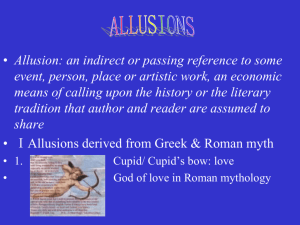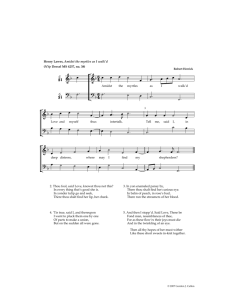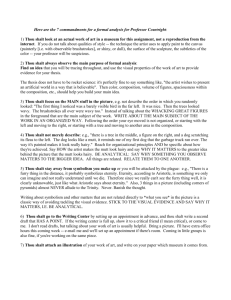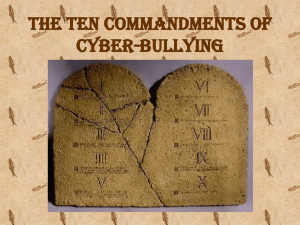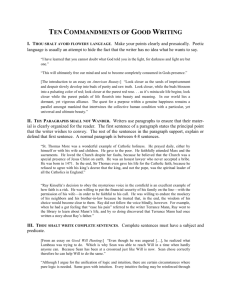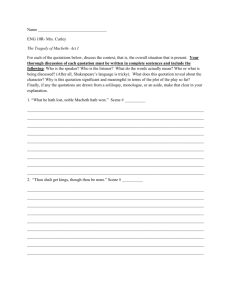Allusion: an indirect or passing reference to some event, person
advertisement
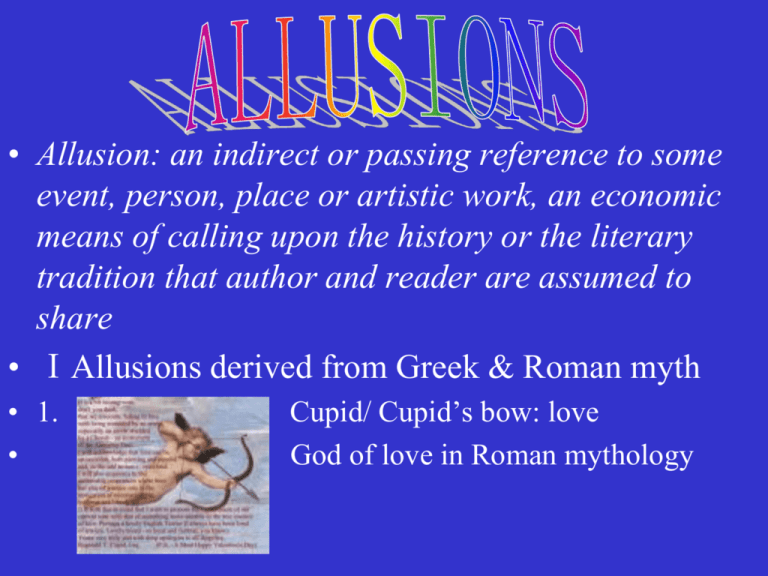
• Allusion: an indirect or passing reference to some event, person, place or artistic work, an economic means of calling upon the history or the literary tradition that author and reader are assumed to share • ⅠAllusions derived from Greek & Roman myth • 1. • Cupid/ Cupid’s bow: love God of love in Roman mythology Helen: an extremely beautiful woman for who men would be willing to fight and die Daughter to Zeus and Leda, wife to Menelaus, the king of Sparta, the matchless beauty with “the face that launched a thousand ships” eloped with Paris , Prince of Troy, which led to the Trojan War and hence the destruction of Troy. • 3. • • • Apollo: handsome man, perfect man Greek god of sun, symbol of rationality, intellect, justice, creativity and beauty • 4. • • • • • Amazon: a strong, aggressive and masculine woman The Amazons were a tribe of warlike women who had their right breasts cut off to facilitate the drawing of a bow. • 4. Prometheus: a creative and courageous man • who defies authority • Titan Prometheus stole fire from the gods and • gave it to man. As punishment, Zeus chained • him to a rock where an eagle tore out his • liver by day; by night, it was restored so the torture could begin again. • 5. Pandora’s box: a source of troubles and disasters • To punish Prometheus, Zeus sent him a mortal • woman with a sealed box as a gift. Not able to • contain her curiosity, she opened the box and out • flew all the evils of mankind. • 6. Achilles’ heel: a vulnerable point, a fatal weakness • The hero was invulnerable to mortal wounds because his mother had dipped him as an infant into the magical waters of the River Styx, except for the heel by which his mother held him. • 7. Pygmalion: one who creates or remakes another person by teaching skills or accomplishments and then falls in love with his or her protégé. • Pygmalion was a sculptor who rejected the love of all women and created a statue of the ideal woman with whom he fell madly in love • George Bernard Shaw’s play Pygmalion and the musical My Fair Lady both used the story. • 8. Icarus: someone who disregard warnings and pays the price for pride • Daedalus, an artisan who constructed wings of wax and feathers to escape from imprisonment warned his son, Icarus, not to fly too high lest the sun would melt the wax. Icarus ignored his father’s warning and fell to his death. • • 9. • • • • • • • 10. • • • Odyssey: a long and complicated journey, be it physical, mental, emotional or spiritual. Odyssey, the title hero in Homer’s epic poem, wandered for 10 years before he could reach home after the Trojan War. Trojan Horse: sth or sb intended to defeat or subvert from within It was a strategy devised by the Greeks to conquer the city of Troy. • Ⅱ Allusions derived from the Bible • 1 • Garden of Eden: an unspoiled, idyllic, peaceful place • 2 Adam and Eve: man’s ancestors • 3. • Noah’s Ark: a sanctuary, a safe haven • 4. Solomom: a wise man, a sage • 5. Judas: a traitor, a betrayer • 6. Last Supper: a farewell dinner • 7. Ten Commandments: strict rules or orders • • • • • • • • • • • 1. Thou shalt have no other gods but me. 2. Thou shalt not make unto thee any graven image. 3. Thou shalt not take the name of the Lord thy God in vain. 4. Remember the Sabbath day to make it holy. 5. Honor thy father and thy mother. • 7. Ten Commandments: strict rules or orders • • • • • • • 6. Thou shalt not murder. 7. Thou shalt not commit adultery. 8. Thou shalt not steal. 9. Thou shalt not bear false witness. 10. Thou shalt not covet. • 8. Judgment Day: the end of the world • 9. Forbidden fruit: sth morally wrong, esp. sex outside marriage • 10. Tower of Babel: a confusion or scene of noisy confusion of sounds and voices • Ⅲ Allusions derived from the fairy tales, Aesop’s fables and legends • 1. Snow White/Sleeping Beauty/Cinderella /Beauty and the Beast: a pretty girl whose kindness is rewarded in the end • • 2. • Pinocchio’s nose: an indicator of falsehood • 4. Cry wolf: send out false alarm • 5. • Robin Hood: a heroic figure who robs the rich to help the poor • 6. • Aladdin’s lamp: sth that can satisfy all wishes and whims of mankind • 7. • Bell the cat: to do a daring or risky deed • 8. Midas touch: an uncanny ability for making money in every venture, a golden touch • 9. Sword of Damocles: an impending potential danger • Damocles was invited to a banquet where he was seated under a sword suspended by a strand of hair as a reminder that people with power are in a similar precarious situation. • 10. Emperor’s new clothes: something meaningless or wrong that is automatically and uncritically agreed with • Ⅳ Allusions derived from historical events • 1. • • • Cross the Rubicon: make an irrevocable decision Julius Caesar crossed the river, knowing well that this step would mean civil war. • 2. Pyrrhic victory: a victory won at excessive cost, a cost that outweighs expected benefits • Pyrrhic, the king of Epirus, defeated the Romans with heavy losses. • 3. Cut the Gordian knot: take decisive, swift action to resolve a complicated problem once and for all • The Gordian knot is an intricate knot and whoever could undo it would rule all Asia. Many tried to untie it but in vain until Alexander the Great cut the knot with a single stroke of his sword. • 4. • • • • Meet one’s waterloo: suffer a decisive or final defeat or setback Waterloo was the scene where Napoleon was totally defeated by Duke of Wellington. • 5. • • • • • • • Dunkirk: a retreat to avoid total defeat or a crisis situation that requires a desperate last effort to forestall failure Dunkirk was the scene of the greatest military evacuation in history. During WWⅡ, 340,000 men were rescued from the beach by allied ships while under attack by Germans. • 6. • • • • • • 7. • • • • D-day: any beginning day of a major event June, 6, 1944 was the date when allies forces launched a massive counterattack against Nazi German in Normandy, France. Pearl Harbor: a surprise attack On Dec., 7, 1941, a Day of Infamy in US history, Japanese forces secretly attacked US naval base of Pearl Harbor. • 8. The Fifth Column: hidden traitors within an organization • In the Spanish Civil War, the fifth column referred to a group of secret sympathizers or supporters of an enemy that engage in espionage or sabotage within the country. • Ⅴ Allusions derived from the literary works(titles, characters, quotations) • • • • • • • 1. Shakespeare’s works Romeo and Juliet: devoted lovers Hamlet: a melancholy and hesitant man Much Ado About Nothing All’s Well That Ends Well 2. Shakespeare’s characters Shylock: a cruel, merciless loan shark (The Merchant of Venice) • Falstaff: a cheerful, sociable and mischievous man (Merry Wives of Windsor and Henry Ⅳ) • Iago: a villain (Othello) • 3. Shakespeare’s quotations • All the world’s a stage: all life is theater and we have to play our part in it (As You Like It) • All the world’s a stage, • And all the men and women merely players; • They have their exits and their entrances; • And one man in his time play many parts…. • Sound and fury: great but meaningless noise (Macbeth) • Life’s but a walking shadow, a poor player, • That struts and frets his hour upon the stage, • And then is heard no more; it is a tale • Told by an idiot, full of sound and fury, • Signifying nothing. • 4. • • • Don Quixote: a chivalrous man who is romantically unrealistic and unrealistically idealistic (Don Quixote by Cervantes) • 5. • Don Juan: a womanizer, a libertine, a lady-killer (Don Juan by Lord Byron) • 6. • • • • Robinson Crusoe: a castaway living in a isolated place (Robinson Crusoe by Daniel Defoe) Man Friday: an efficient and devoted aide (ibid) • 8. • • Uriah Heep: a fawning sycophant, a unctuous hypocrite (David Copperfield by Charles Dickens) • 9. • Mr. Micawber: a kindhearted, incurable optimist (ibid) • 10. • • Scrooge: a miser, a skinflint, a cheapskate (A Christmas Carol by Charles Dickens) • 11. • • Mr. Pickwick: a fat, naïve, kindly, cheerful man (Pickwick Papers by Charles Dickens) • 12. • • • • Jekyll and Hyde: one having a twosided personality, one side of which is good, the other evil (The Strange Case of Dr. Jekyll and Mr. Hyde by Robert Stevenson) • 13. • • • • Frankenstein: one who creates and is ultimately destroyed by a technological marvel or scientific advance (Frankenstein by Mary Shelley) • 14. Faustian bargain: a bargain made • for present gain without regard • for future cost or consequences, a • pact with the Devil– selling one’s • soul in order to gain power, knowledge, wealth, beauty or other desired goals (Faust by Goethe) • 15. • • • Holden Caulfield: a teenager who is repelled by the phoniness and hypocrisy of the adult world (The Catcher in the Rye by J. D. Salinger) • 16. • Lolita: a precociously seductive girl (Lolita by Vladimir Nabokov) • 17. • • • Main Street: an environment of materialistic, complacent provincialism (Main Street by Sinclair Lewis) • 18. • • • • • 19. • • Walter Mitty: a hen-pecked daydreamer who escapes boredom by imagining himself in heroic adventures (The Secret Life of Walter Mitty by James Thurber) Catch-22: an illogical, unreasonable, senseless situation (Catch-22 by Joseph Heller) • 20. • • Shangri-la: a remote, beautiful, ] peaceful place, a utopia (Lost Horizon by James Hilton)
